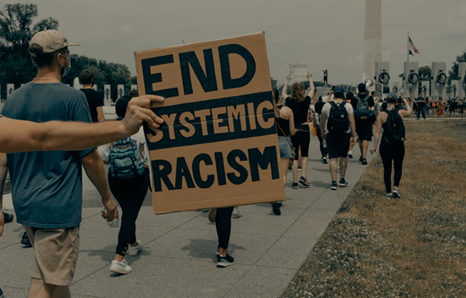I’ve been watching the misadventures of Matthew Franck’s insightful article criticizing the concept of systemic racism. It originally appeared for two hours yesterday morning at Newsweek online. Apparently the opinion editor fought to have it posted, but the editor-in-chief swooped in to remove it without explanation. Franck explains the behind-the-scenes chicanery at The Public Discourse where the full article is now posted. It’s not encouraging. Is the concept of systemic racism so brittle that it can’t be scrutinized? Or are Newsweek editors too afraid to allow a thoughtful piece questioning the new orthodoxy? Who knows?
In any case, it’s a shame that Newsweek would not stand by Franck’s column because he is highlighting something very important and under-considered in our national upheaval over race issues. Franck questions the utility of systemic racism as a category. He writes:
The “system”—a college, or a profession, or the nation as a whole—is said to be suffused with racism, and asking for the identity of the culprits is supposed to be a sure sign of the inquirer’s naïveté. The fault for systemic racism is no one’s in particular, and everyone’s in general. Or at least everyone not belonging to the aggrieved class of its victims.
This unique feature of systemic-racism theory is indicated by its very name. As Bryan Garner observes in Garner’s Modern English Usage, there is a substantial difference between the words “systematic” and “systemic.” Something systematic has been “carried out according to an organized plan,” or represents a “habitual, deliberate” pattern of behavior. American chattel slavery was systematic racism. So was Jim Crow. So, in a softer and less obvious way, say its critics, is affirmative action.
But a thing is systemic if it affects or is a feature (Garner again) “of an entire system; systemwide.” Notice that no personal agency is required, or indeed is any part, of a systemic phenomenon. And there’s the beauty of systemic-racism theory: “who’s to blame” is never answered with any particularity that will fix responsibility on known persons, for the answer is “why, everyone!” What could be more impervious to contrary evidence than a wholly impersonal conspiracy theory about human behavior?
We can sensibly talk about individual, or legal, or even institutional racism. All these can be blamed on someone. Perhaps someone in the past set certain racist policies in place; even so, if the policies are still in effect, someone today is perpetuating them and could change them. But while an apparently disparate racial impact of a policy may raise initial suspicions that the policy itself is racist, it is no proof of the matter, for disparate outcomes can have multiple causes, some blameless, others blameworthy.
Franck puts his finger on the crucial point. In common parlance, racism is a moral term. The common usage in the American Heritage Dictionary, for example, defines racism as “discrimination or prejudice based on race.” It involves human agency and implies moral accountability. But no human agency or moral responsibility need be present for a person to be involved with systemic racism. Nevertheless, critical race theorists accuse those involved with systemic racism of being involved in culpable racism. Richard Delgado and Jean Stefancic are a case in point. They write,
Many critical race theorists and social scientists hold that racism is pervasive, systemic, and deeply ingrained. If we take this perspective, then no white member of society seems quite so innocent (Critical Race Theory, p. 91).
Notice that, for Delgado and Stefancic, systemic racism is culpable racism even though one may not have exercised any moral agency in being a part of it. The reason for this is that systemic racism focuses on outcomes not on intentions. Robert VerBruggen defines systemic racism in its broadest sense as “any social process that results in racial disparities, in which case it’s more of a catch-all concept than a testable claim.” If, for example, a town in Nebraska has more white people who go to college than black people, that disparate outcome would be a sign of systemic racism. A white student matriculating at the local university may actually be “woke,” but he is nevertheless participating and complicit in a racist structure that victimizes black students. The white student may not have a racist bone in his body, but that is irrelevant in this case. He is a fixture in a racist system and is thereby tainted.
And this is where ordinary Christians who are not schooled in the absurdities of Critical Race Theory get lost. The Bible teaches them that racism is morally wrong and that they are morally responsible for the moral choices that they make. But what are they to do when they find themselves accused of systemic racism? A racism in which they may have no moral agency? How can one be morally accountable for something they didn’t choose to do? Moreover, how can they be morally accountable for something that they may actively oppose?
The question Franck raises does not deny that slavery, Jim Crow, and segregation have ongoing legacies that need to be reckoned with. It may be that there are legal or educational or institutional inequities that are the direct result of what Franck labels “systematic racism” and that need to be rectified. However, is it right to label every racially disparate outcome as racist? It seems that some of the confusion on this question stems from sloppy language. Again, racism is morally freighted language, and that is why it is worth asking whether every disparate outcome is rightly labelled as racism.
I’ve been thinking about this a lot lately because of my own faith tradition’s teaching on racism. I am a Southern Baptist Christian, and my denomination’s confessional statement treats racism as a sinful vice alongside greed, selfishness, sexual immorality, adultery, homosexuality, and pornography. In other words, racism is a sin that the Christian must renounce and oppose wherever he encounters it—be it in his own heart or in the surrounding culture. In our confession, racism requires moral agency and responsibility. Does the racism in “systemic racism” match what our confession says in this respect? I don’t think it does, and that is where the category falters. Our confession treats racism as a sin to be repented of, but systemic racism does not require a sin on the part of the individual who may be caught up in the system. There can be no repentance from this particular evil.
This is where I have come to have serious problems with the category of systemic racism—at least as the term is defined in Critical Race Theory (CRT).1 My church’s confession teaches me to treat racism as sin. CRT teaches that racism of the systemic sort need not involve any moral agency at all. This clash confuses people as to what their duties are and what righteousness requires. This isn’t just a Southern Baptist problem. Lots of people want to do the right thing, but how does one do the right thing when no moral agency is required to be complicit in systemic racism? For example, are the white students who go to college in the little town in Nebraska somehow morally responsible for racism because they went to college at a greater rate than black students? Are they morally obligated to opt out of college until all disparate outcomes are eliminated? Most fair-minded people sense the absurdity of such a proposal.
What are we to make of all this? I don’t pretend to have reached a solution to how we talk about these things, but I wonder if Christians might be able to agree on a few ground rules to establish clarity as we deliberate.
First, let’s affirm that racism is still a problem in the world and probably working in our own hearts in ways that we are not even conscious of. That is the subversive nature of sin, and we should not be surprised that racial partiality may be at work in unexpected places. We should also affirm that our culture still reckons with the legacies of what Franck calls “systematic racism” of previous eras. Those legacies may require institutional and systemic remedies. Where that is the case, “let justice roll down like waters, and righteousness like an ever-flowing stream” (Amos 5:24).
Second, can we leave behind the highly tendentious notion that all disparate racial outcomes are universally explained by racism? Critical Race Theory explains all disparities as evidence of racism and white supremacy. But can we not see that this explanation is more often assumed than demonstrated?
Third (and this one is focused on my Southern Baptist context), can we agree together to use the morally charged language of racism in ways that reflect the fact that racism is sin? In other words, can we speak of racism in ways that are consistent with our confession? If we apply the word racism to every racially disparate outcome, we imply moral agency where there may be none. We need moral clarity, not moral confusion. The category of systemic racism often yields the former rather than the latter. Franck recognizes this problem, but will we?
—————
1 I affirm the SBC’s historic 1995 resolution repudiating slavery, Jim Crow, segregation, and racism. That resolution employs the term “systemic racism,” but I understand the use of that phrase in the resolution to mean something different than its use in Critical Race Theory. In brief, the phrase “systemic racism” in the SBC resolution seems to involve human agency and responsibility, whereas such is not the case with its use in CRT. This probably deserves elaboration, but I will save that for another time.






